Edgbaston Test an instant Ashes classic typified by battle between two captain fantastics
In the end, after five days of the most brilliant Test-match cricket, it came down to the captains and Pat Cummins was prepared to make amends for 2019’s Headingley affair.
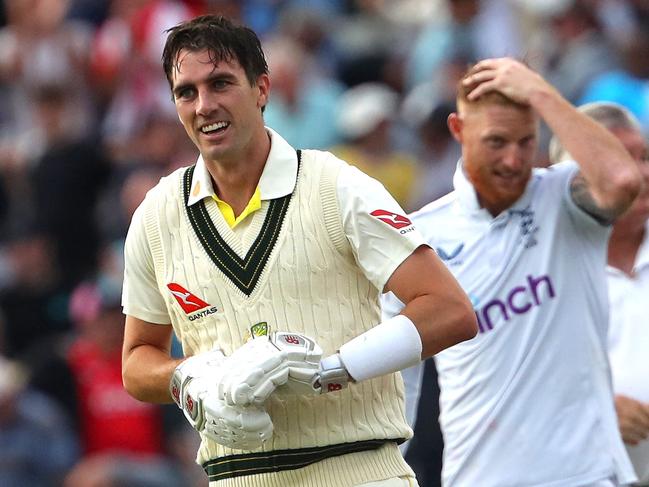
Australia had the last word. There are many different roads to take in Test cricket, the one well trodden as well as the one less travelled, and after sticking to their guns with a tried and tested method in the face of England’s all-out aggression, Australia won a pulsating match by the finest of margins. Edgbaston 2023, a brilliant, absorbing Test will be inked into the history books as a classic.
It was 7.21pm in the evening, after a slow and tense day’s cricket, when Pat Cummins, up on his toes, guided a short ball from Ollie Robinson down to third man to scamper two of the three runs needed for victory. Sprinting around the boundary was Harry Brook, who was looking to flick the ball towards Zak Crawley, running towards him, but who could only palm the ball over the rope instead. Australia had a two-wicket victory that had looked unlikely when Cummins walked to the crease.
Robinson had a lot to say for himself during this match, after spraying Usman Khawaja in the first innings and doubling down in his press conference later that day. At one point, he opined on Australia’s tail, which, he said, included three No 11s. One of them, Nathan Lyon, who had enjoyed a terrific match with the ball, was entitled to a wry smile at the end of the game after sharing a ninth-wicket unbeaten partnership of 55 with Cummins. One shot, a drive over mid-on off Stuart Broad, was as elegant as anything played in the match.
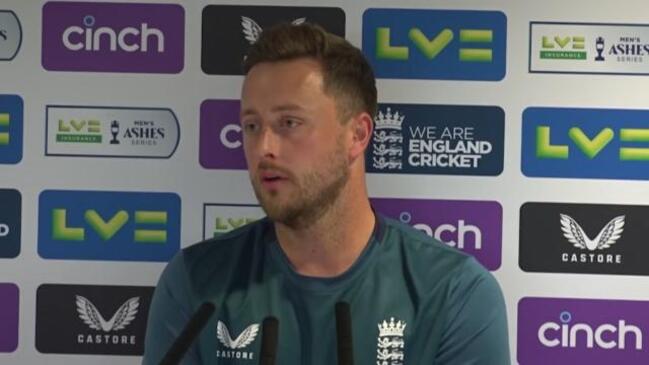
Australia were still 72 runs adrift when Cummins, Australia’s very own version of captain fantastic, came to the crease to join Alex Carey, replacing Khawaja. Australia’s batting had been stifled by a slow pitch, by some suffocating fields set by Ben Stokes and by their own desire to move along cautiously, working around the man of the match, Khawaja, who added a five-hour half-century to his eight-hour hundred in the first innings.
As well as being a brave, bold and brilliant captain, Stokes has a keen sense of sporting drama and theatre. It was at 5.30pm., with the match on the line and Khawaja defiant and unflappable, that he brought himself on to bowl for the first time in the innings to try to make the decisive contribution. The crowd knew the importance of the moment and roared him in, and 12 balls later he delivered, as Khawaja dragged a slower ball on to his stumps. At that point it was England’s match to lose. But for once in the over-my-dead-body, never-say-die stakes, Stokes had found his match. Broad-shouldered and full of belief, Cummins strode to the crease to add 18 with Carey first of all, until the left-hander was brilliantly caught and bowled by Joe Root, having tried to up the tempo at last. Then, with Lyon for company, Cummins picked his moments to attack, including two straight sixes off Root, and bravely defended anything short and aimed at his body.
Only one chance was missed in that final, agonising partnership and that was when Stokes launched himself skywards to almost take a brilliant one-hander as Lyon aimed a leg-side pull off Broad. Reminiscent of his famous boundary catch in the 2019 World Cup, Stokes twisted and turned himself mid-air, reaching over his head, but the ball failed to stick in his hand as he hit the turf. Australia needed 37 more runs at this point and did not give another chance.
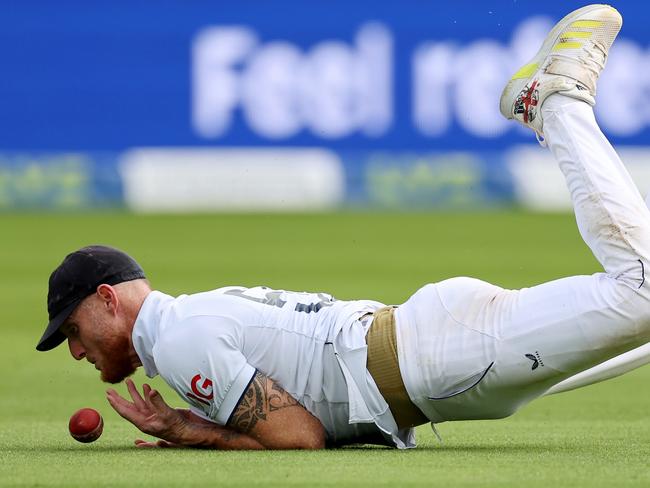
England took the second new ball eventually, with Australia needing 27 runs to win, but James Anderson, below his best for much of this game, was passed over in favour of Robinson. Broad tried desperately to rouse the crowd but not even they could stir something from him, and Broad looked out on his feet at the end. England lacked the extra cutting edge on a slow pitch that Mark Wood may have provided against the tail, and Moeen Ali’s finger was cooked.
Ali’s selection will be one of many issues that England supporters will pore over in the coming days. He was clearly unable to fulfil the role that Stokes needed of him, pushing through the pain barrier and trying his best though he did. There will be other matters to debate too, notably the decision to declare in the first innings, when Root was in full control, as well as the chances missed by Jonny Bairstow on his return to the team as wicketkeeper.
But what should not be forgotten was that England played some brilliant cricket in this game, making the running against the world champions, and almost breaking them in the process. It is impossible to know what an alternative narrative would look like, but what cannot be doubted is the wholehearted way England threw themselves into the contest. They should be confident of testing Australia again.
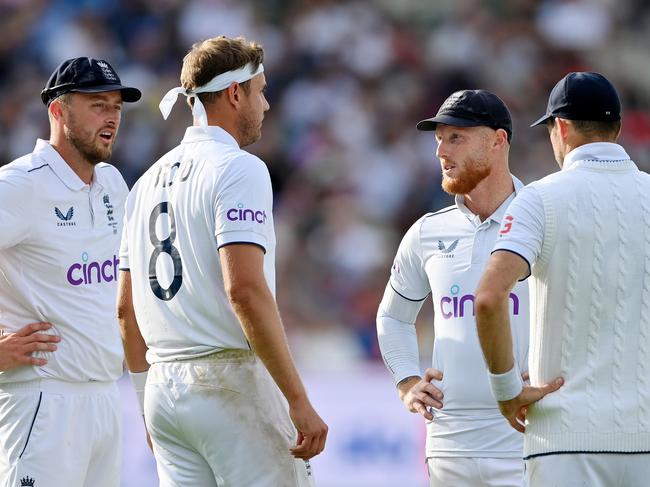
When play finally got under way at 2.15pm, it was difficult to know whether the weather delay had played to either side’s advantage. On the one hand, the heavy cloud cover raised hopes that the ball might move as it had done for Australia in the thundery weather of the third day; on the other, was the damp outfield which was liable to make the ball soft and less likely to swing. The requirement had not changed: 174 to win, seven wickets to take, albeit in 67 overs once play began.
Any fears that it was going to be difficult to recreate the atmosphere from the previous evening were allayed by the capacity crowd and enthusiasm that greeted the players, although for the most part they sat in nervy silence after that. England began by applying pressure through Anderson and Broad and only 14 runs came in the opening seven overs. Having frustrated England for 39 balls, Scott Boland then edged an attempted drive off Broad, and Edgbaston had its first roar of the day.
Head was immediately greeted with a short-pitched ploy and it took him 13 balls to get off the mark. One shot before he did so illustrated his frustration as he backed away from a short ball and tried to club it through the off side. After an hour’s play and 13 overs, only 21 runs had been gathered. As in the field, Australia were aiming to take a different path to victory and the slowness of the pitch meant England had to tease out wickets rather than blast. The pace of the game dropped.
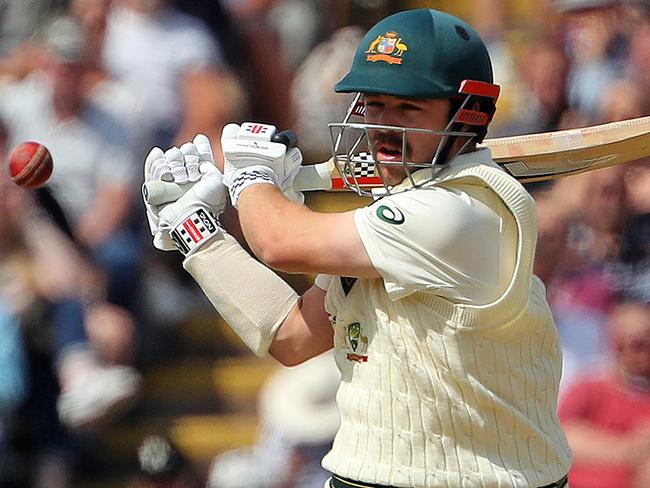
The first ball after drinks brought the first boundary off the bat, although off the edge would have been a more accurate description, as Head aimed a pull shot to Broad and top-edged over Bairstow. Unconvincing. Stokes then turned to Ali, whose first over started badly, with two short balls that were punished, and finished excellently, as Head steered one that spun sharply to slip. Ali was mobbed.
Khawaja went to 50 – 143 balls with seven fours – and rarely moved out of first gear. Having made an adjustment to his stance, more over to off stump to avoid a repeat of the first innings, Cameron Green fared better against Ali this time, although his first assertive stroke came when he drove Anderson over the top for four. When the tea break came Australia were 183 for five, 98 short of their target; six down when Green dragged Robinson on to his stumps shortly after the break.
In the end, after five days of the most brilliant Test-match cricket, it came down to the captains. Stokes, having delivered the vital wicket of Khawaja, bowled 24 balls at Cummins who repelled them all, taking just two singles, determined to see his opposite number out. Stokes then removed himself from the fray, clearly limping and sore, and Cummins took over. It was Cummins, of course, whom Stokes had cut to the boundary at Headingley four years ago and now Cummins prepared to make amends.



